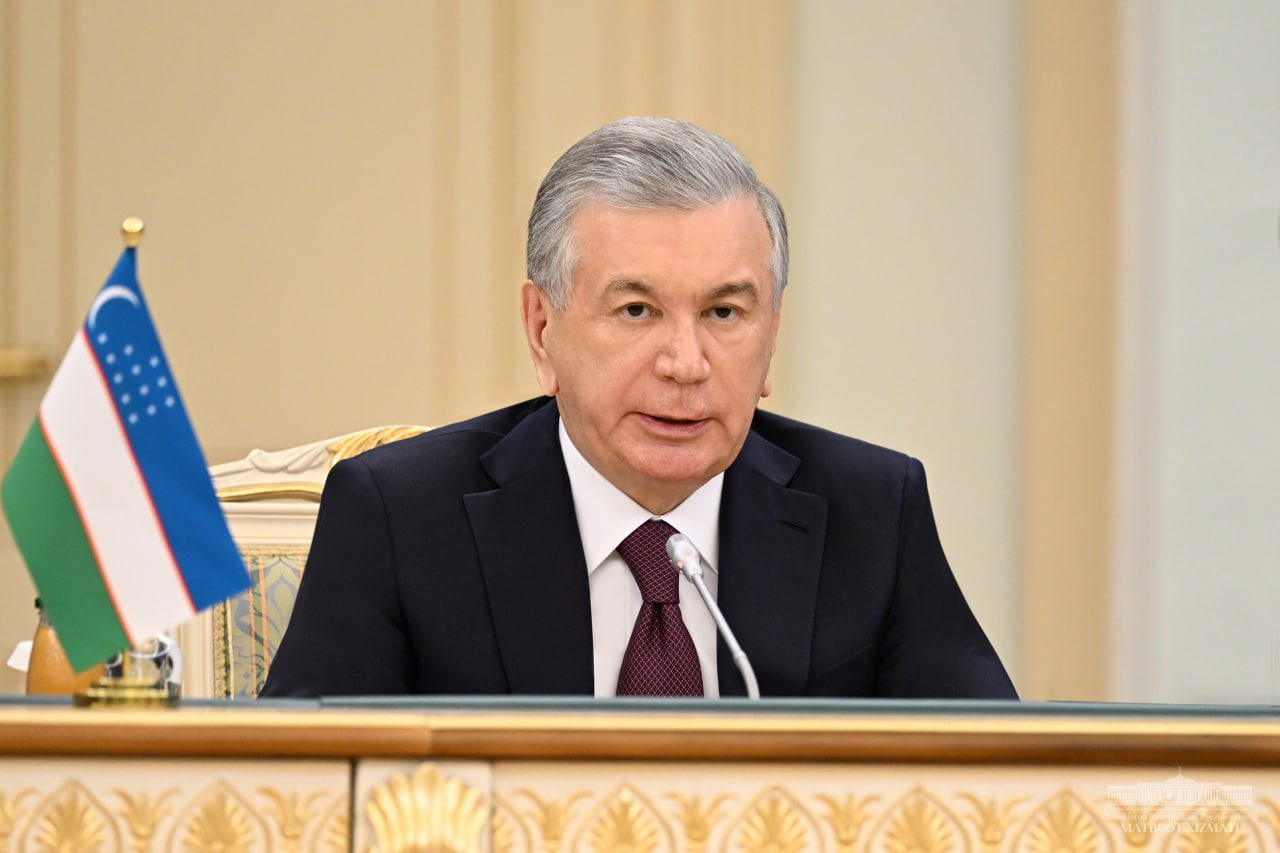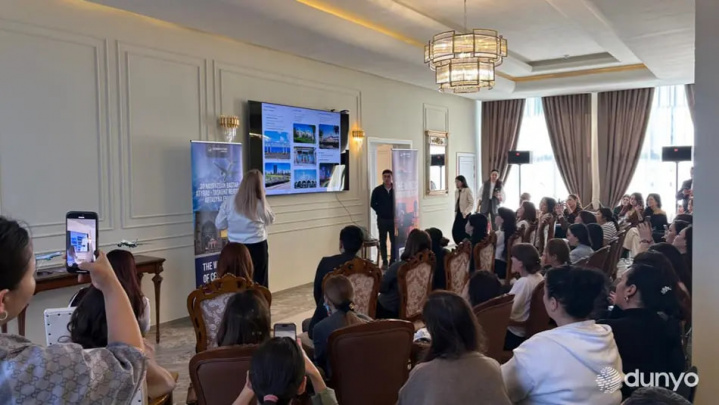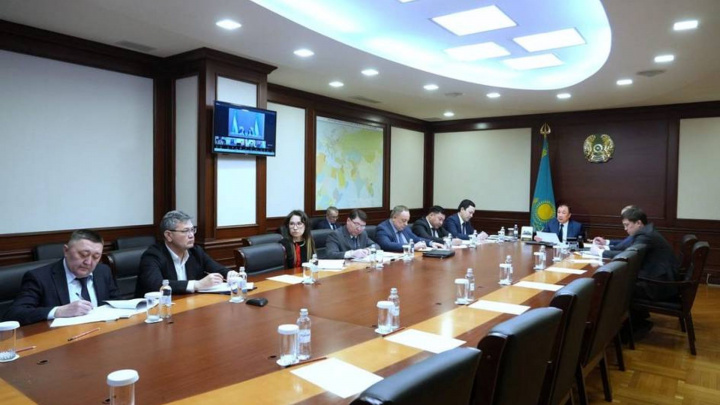"We have opened a new chapter in the chronicle of centuries-old friendship and good neighborliness with Kazakhstan" — Shavkat Mirziyoyev
On August 9, President of Uzbekistan Shavkat Mirziyoyev participated in the sixth Consultative Meeting of Central Asian Heads of State in Astana.

Photo: Presidential press service
The event, chaired by Kazakhstan's President Kassym-Jomart Tokayev, was also attended by Kyrgyzstan's President Sadyr Japarov, Tajikistan's President Emomali Rahmon, Turkmenistan's President Serdar Berdimuhamedov, Azerbaijan's President Ilham Aliyev as an honorary guest, and Kaha Imnadze, Head of the UN Regional Center for Preventive Diplomacy for Central Asia.
The meeting's agenda included discussions on expanding multifaceted cooperation in the region, including enhancing political dialogue, advancing joint programs and projects in trade, investments, transport, energy, agriculture, and ecology, fostering cultural and humanitarian exchanges, and addressing modern threats and challenges.
In his speech, the President of Uzbekistan highly valued the collective efforts to strengthen regional solidarity and expand multifaceted cooperation.
"Our open and effective dialogues, the important initiatives proposed, the launch of numerous multilateral projects and programs, the implementation of joint events, and other actions have fundamentally changed the face and image of the region," Shavkat Mirziyoyev stated.
He emphasized that the countries in the region have begun to effectively collaborate and resolve important issues. The volume of mutual trade, investments, cargo transportation, and visits of citizens have significantly increased. The growing interest of foreign countries in the region is evidenced by various meetings held in the "Central Asia Plus" format.
"Today, we can confidently say that the process of forming a unique regional identity has begun," said the President of Uzbekistan.
The President supported his colleagues' proposals for launching regional cooperation mechanisms and institutions, including meetings of national coordinators, representatives of sectoral ministries and agencies. He stressed the need for effective tools to implement the decisions being made and advance joint projects at the current stage.
"It is time to jointly consider further enhancing the format of the Consultative Meeting to deepen regional integration and enrich the long-term partnership agenda," the Uzbek leader said.
To develop conceptual recommendations and proposals on these issues, it was suggested to hold the next meeting of the Central Asian Expert Forum in Uzbekistan.
Touching on the current global situation, the President of Uzbekistan noted that Central Asia, due to its geopolitical location, is experiencing all the negative consequences of the global trust crisis and escalating conflicts.
Traditional trade and transport chains have been disrupted, countries in the region have become hostages of sanctions policies, logistics costs have significantly increased, inflationary pressure is growing, opportunities in the global capital market are shrinking, protectionism is increasing, and new barriers are emerging.
In addition, issues related to developments in Afghanistan have taken a backseat on the international agenda.
The prosperity of Central Asian countries largely depends on joint efforts, close cooperation, decisive actions, and the willingness to jointly promote regional interests. In this regard, the development of a strategic document — a Concept for Ensuring Regional Security and Stability — was proposed.
Based on the analysis of the impact of global processes on the sustainable development of Central Asia, the President of Uzbekistan outlined several priority areas for practical cooperation in the region.
Firstly, the need for new drivers and models for developing long-term economic partnership was emphasized.
"Our countries are natural trade partners, and our national economies complement each other," said Shavkat Mirziyoyev.
"At the same time, today, the share of regional trade in our countries' total trade turnover is small. Barriers to forming a full-fledged free trade area in the region remain in place.
Analyses highlight that implementing the first priority measures could double the volume of mutual trade in the next five years.
This includes eliminating tariff and non-tariff barriers, mutual recognition of conformity certificates and unification of regulations, digitizing customs operations and phytosanitary procedures, and exploring opportunities for easing state procurement from one another.
Forming a single regional market should be a strategic goal for the long term.
The head of state proposed establishing regular meetings at the level of the Economic Council - Deputy Prime Ministers to address all these issues.
Uzbekistan is prepared to host the first of these meetings next year and to organize a Central Asia business partnership week, including a Regional Forum and sectoral conferences, an industrial potential exhibition-fair, and presentations on export opportunities.
Special attention was given to promoting industrial cooperation. There are successful examples in this regard, including cross-border cooperation areas, modern automotive projects, household electronics, pharmaceutical products, agrarian and textile clusters, logistics centers, and infrastructure facilities.
"We can achieve the formation of a single map for the industrialization of the region by combining our efforts to create short added value chains, attract investments and technologies from leading international companies, and introduce new forms of cooperation," said the head of state.
It was proposed to establish a Council at the ministerial level and to prepare a program document in this regard.
It was also emphasized that the establishment of the Central Asia Investment Council, the Innovation Development Bank, and the regular holding of joint investment forums are promising.
The development of regional transport-communication networks was noted as another priority area for cooperation. Given the region's geographic features, the share of external trade transport costs reaches up to 50% of the final value of goods, which is four to five times higher than the global average.
In this context, shaping and implementing an agreed tariff policy, applying incentives and preferences to support national carriers, modernizing the transport sector and infrastructure, increasing the throughput capacity of border points, and digitizing the transport sector require a systematic approach.
The need to coordinate efforts to ensure food security was highlighted. According to calculations by experts from the UN Food and Agriculture Organization, Central Asian countries can not only meet their needs for basic food products but also secure a strong position in the international market.
For this, it is important to introduce innovative technologies in agriculture and water conservation, increase productivity, develop deep processing, strengthen scientific research in the field of selection, and establish clusters and "smart" farms.
To develop a Regional Strategy in this area, it was proposed to hold a meeting of the region's agriculture ministers within the framework of an international forum on ensuring food security for landlocked countries, which will take place in Tashkent in September this year.
The head of state paid special attention to the issues of climate change. Rising temperatures, melting glaciers, floods, droughts, dust storms, and many other natural phenomena continue to cause serious damage.
"In November this year, at the Climate Summit in Azerbaijan, our countries may present a unified position. At this point, it is about conducting a joint presentation on the environmental situation in the region to draw the attention of the international community, funds, and donor organizations to solving these acute problems, including the Aral Sea disaster," said Shavkat Mirziyoyev.
Additionally, it was proposed to develop and adopt a comprehensive program for the sustainable development of Central Asia and a regional strategy for the rational use of transboundary river water resources.
Cooperation in the energy sector was noted as a key direction of collaboration among the countries of the region. Currently, several strategic projects are being developed to increase electricity production on a regional scale and to export it to third countries.
Furthermore, there are plans to develop nuclear energy and increase the supply of hydrocarbons.
The President of Uzbekistan highly praised the development of effective exchanges between the parliaments of the region's countries and expressed his full support for this. In this regard, he proposed holding the next Inter-Parliamentary Forum in the city of Khiva next month.
Touching on issues of cooperation in the humanitarian sphere, our head of state emphasized the need to "pay great attention to strengthening the sense of relevance, solidarity, and shared responsibility of our peoples for the future of the region, taking into account the commonality of cultural and historical heritage."
The rapid launch of the international media platform "Central Asia History and Culture: A Shared Past and a Common Future" will be an important practical step in this direction.
To further strengthen mutual understanding and solidarity among the peoples of the region, it was proposed to hold a scientific forum dedicated to the practical aspects of shaping regional identity.
It was noted that the regular holding of the regional competition for innovative ideas and projects would serve to advance the "Central Asia Youth Agenda - 2030" and involve the younger generation in cooperation programs.
The President of Uzbekistan put forward several initiatives to develop cooperation in the field of education. It was noted as important to adopt a Central Asia Education and Academic Exchange Program, develop an agreement on the mutual recognition of diplomas from leading higher education institutions, and allocate scholarships based on mutual agreements for talented students.
To thoroughly discuss these issues, the first Central Asia Education Forum is planned to be held in Tashkent in October.
Tourism was identified as a new driver of regional partnership. To expand tourism exchanges, it was proposed to explore the issue of mutual recognition of national ID cards and to develop mass tourism products based on the principle of "one tour - the entire region."
In conclusion, the President supported the adoption of a concept for the development of regional cooperation up to 2040 and proposed preparing a multilateral agreement on strategic partnership and cooperation in Central Asia.
The President of Uzbekistan expressed confidence that the effective results of this meeting would further strengthen friendship and good-neighborly relations in Central Asia and expand practical cooperation for the prosperity of the region's peoples.
The President invited the leaders of the Central Asian states to participate in the seventh summit to be held in Uzbekistan next year.
Related News

14:00 / 04.03.2026
Central Asia as an Emerging Cluster

17:38 / 28.02.2026
Direct Tashkent – Atyrau flights to begin in late March

17:37 / 21.02.2026
Uzbekistan and Kazakhstan aim to double rail freight volume to 60 million tons

13:39 / 21.02.2026




